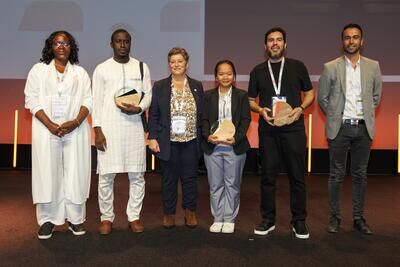 Actualités
Actualités 
IRD Innovation Awards: three laureates to foster sustainable development in Southern countries
During the international SCIENCE4ACTION forum organised by the Institute for Research and Development (IRD in French) in Marseille, the Trophées de l’innovation (Innovation Awards) have been awarded to recompense interdisciplinary and multi-stakeholder approaches with significant impact potential in Southern countries. The three winners of this edition are two French alumni doctorate students: Kakada Oeum for the Asia and Pacific region and Pablo Lara for the Latin America and Caribbean region, and Waly Faye, an international doctorate holder, for Africa.
Aiming for Goals of Sustainable Development
The Institute for Research and Development (IRD) is an internationally-recognised French interdisciplinary public research institute under the supervision of the French ministries of research and of foreign affairs, and mainly working in collaboration with Southern countries and French overseas regions.
The IRD describes itself as “a key player of the international agenda for development”. Its original model relies on fair scientific partnership agreements with developing countries, and more specifically those located in intertropical regions and the Mediterranean area. The priorities of the IRD are part of in the implementation of the Goals of Sustainable Development (GSD) defined in 2015 by the United Nations, with the ambition to “direct development policies and address the biggest challenges in relation with global, environmental, economic, social and cultural changes impacting all the world”.
Innovation Awards at the heart of discussions
In this spirit was organised the SCIENCE4ACTION international Forum, a “manifesto of science in action” to open a discussion ranging from “reflection to highlighting research on major issues of international scientific cooperation for sustainable development”. The Forum focused on four major subjects: sciences “to address the challenges for humans”, going beyond “the vision of a resource world”, the role of scientists to “transform societies” and the construction of “partnerships for a sustainable world”.
At the heart of these discussion is the Innovation Awards ceremony, to recompense men and women doctorate students, and young researchers “driving innovative projects with strong impact in Southern countries”. These projects illustrate research subjects addressing society challenges, such as those led by the IRD. These projects “must be part of a multidisciplinary process, engage socioeconomic partners and generate true added value compared to existing solutions”. To be noted that this year, the contest was in three languages (French, English and Spanish) and was directed to doctorate students and researchers based in France or abroad.
Laureates with deep impact potential
Nine young scientists were selected this year to compete in the Innovation Awards 2024. Among them, the jury selected three projects led by three laureates who each developed projects with deep impact potential:
the Asia and Pacific region award laureate, Kakada Oeum (Cambodia), a French alumna, doctorate student at UMR PHIM (Plant Health Institute of Montpellier), whose project focuses on improving rice culture, staple food for half of the planet population. By the end of the project, “Cambodian rice bacterial strains could be used as rice bioproducts, reducing the need for chemical pesticides or fertilizers to improve rice yields and inhibit the growth of rice pathogens”;
the Latin America and Caribbean region award laureate, Pablo Lara (Peru), a doctorate student and alumnus at UMR GeoAzur, research lab of the Terre-Océan-Espace of the Université de Côte d’Azur, whose project focuses on the prevention of earthquakes. “My objective is that all countries, regardless of the economic situation, have access to a seismic warning system” declared Lara, who developed a seismic data analysis algorithm for disaster risk reduction;
the laureate of the Africa region award, Waly Faye (Senegal), young researcher at LMI IESOL, a double international lab “Intensification écologique des sols cultivés en Afrique de l'Ouest” (IESOL, ecological intensification of soils cultivated in Western Africa) jointly made by the Senegalere agriculture research institute (ISRA) and the IRD. The winner of the Africa project aims at making the world more viable ecologically thanks to INFILTR’EAU, an “infiltrometer that automates infiltration measurement” that “facilitates measuring physical infiltration variables, particularly hydraulic conductivity, which is crucial for modelling water movement in the soil”.
The three laureates won a 10,000 euros award each to fund the development of their project and a one-year follow-up of their project by professionals to prepare their launch.






Commentaires
Vous devez être connecté pour laisser un commentaire. Connectez-vous.